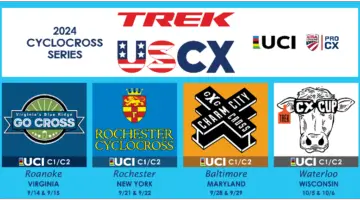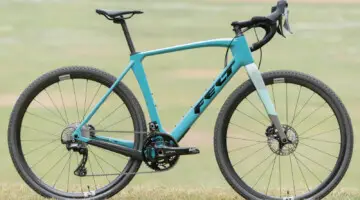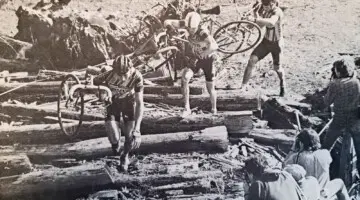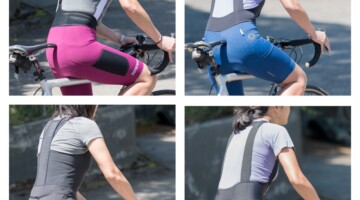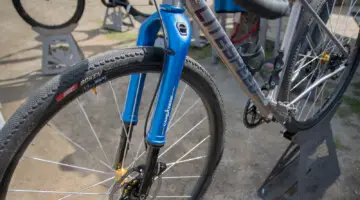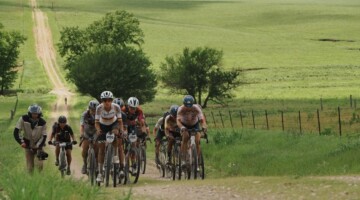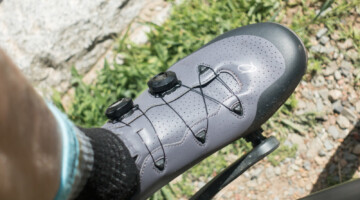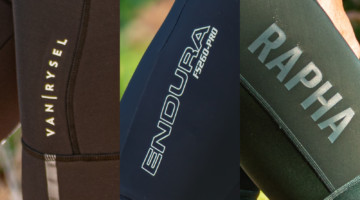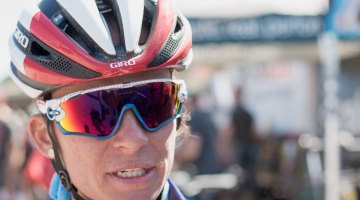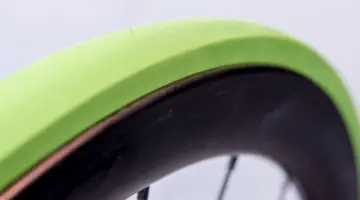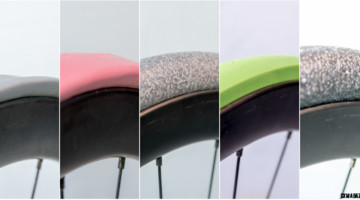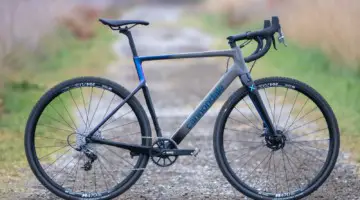This interview was originally published in Cyclocross Magazine’s Issue 1, November 2007.
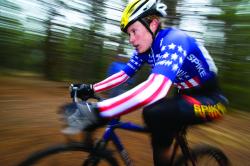 Katie Compton is the reigning national cyclocross champion, as well as the silver medalist at the 2007 UCI World Cyclocross Championships. When Katie won her first national championship in 2004, she surprised her competitors and the media, but she wasn’t a stranger to competing at the top level. The three-time national cyclocross champion had already won gold medals with Karissa Whitsell while piloting their tandem in the Paralympics, IBSA and IPC World Championships, and U.S. Paralympic National Championships.
Katie Compton is the reigning national cyclocross champion, as well as the silver medalist at the 2007 UCI World Cyclocross Championships. When Katie won her first national championship in 2004, she surprised her competitors and the media, but she wasn’t a stranger to competing at the top level. The three-time national cyclocross champion had already won gold medals with Karissa Whitsell while piloting their tandem in the Paralympics, IBSA and IPC World Championships, and U.S. Paralympic National Championships.
With such an impressive resume, one might expect Katie would be an uptight, type-A racer, but she’s surprisingly down to earth, modest, and much more like the girl next door, with the exception that she can kick your butt on a bike. We caught up with Katie after she got back from a training vacation in Montana and chatted about her background, the upcoming season, and her thoughts about the future of ‘cross.
CXM: Why do you race? Why ‘cross?
KC: Simply for the challenge of it; because I like to suffer. I like to push my body in training and racing and see what I can do. I like the competition, especially when I’m not as strong as other racers. It brings my performance up to another level and makes me realize I can go faster or ride stronger or smarter. I also like being fit and being able to drink beer and wine and eat good food without getting fat. ‘Cross is my passion because of the people, the intense racing, and the courses suit me the best. My strengths are technical riding and power on flats, so ‘cross is the perfect fit.
CXM: When did you get into ‘cross? Was it love at first try?
KC: I was in college when I did my first ‘cross race. I had just gotten back from racing for a short time in Europe and hated my bike and wanted to quit racing because I sucked at it. Getting dropped every day isn’t much fun, although I did get to appreciate the views since I spent so much time by myself. I did my first race with a really bad hangover and got second; Sarah Uhl beat me in a race in New Jersey. I raced on my single speed mountain bike and still had fun, so I figured maybe I wouldn’t quit racing.
CXM: What advice would you give a young girl (or boy) that really wants to be good at ‘cross (perhaps idolizes you)?
KC: I think the best advice would be to have fun and only ride and race when you want to. Going out on days when the motivation is low will only make you dislike your bike and can cause burnout.
When you’re young, people tend to think that you have to stay with it to be good and racing at the junior level is so important to be good as an elite, but I think that’s bull. Cyclists get better with age and maturity, so loving your bike and having a passion for riding will get you farther than making yourself ride on a day you don’t want to.
Also, kids need to do other things and hang out with friends who don’t ride so they stay balanced. Getting too serious about racing too soon will kill their passion for riding by the time they hit college. There are always exceptions to that (hell, I’ve been riding and racing since I was 8), but I also took some time off after I was a junior and when I was in college, and my parents never pushed me to ride, it was ways up to me. They encouraged and supported me as much as I wanted but never pressured me. My dad also made an effort to get me to back off when I needed to and helped prevent the burnout.
I would also tell them to ride their ‘cross bike a lot and practice technical skills. Ride your ‘cross bike on trails and work on the technical part since having good skills can really make a difference in how you do as a ‘crosser. Good fitness is important, but having exceptional skills can really save some energy and close gaps if one’s fitness isn’t as strong.
CXM: Many think ‘cross is more accessible to more kids than road, mountain bike, or track. Thoughts on that?
KC: I would agree with that. ‘Cross and mountain biking are also a lot more fun than road racing so it’s keeps kids interested longer. It’s also safer since they aren’t out on the roads fighting traffic. I do think the track is a great place for kids. It teaches them how to race and pedal a bike better. Trexlertown still has the best program for kids and develops some of the best riders. I loved training there when I was a junior – the racing was the best. There were some great coaches there and the group of juniors I trained with was very talented.
CXM: We share a few similarities – our dad’s got us into racing, and we raced Trexlertown when we were really young. Any advice to racing parents on how to interest their kids in cycling?
KC: I think the best way to get kids interested in cycling is to make it fun and find other kids their age to ride with since hanging out with adults when you’re a teenager isn’t much fun. My dad got me riding by treating me to ice cream, a Slurpee, or a Snickers bar during the ride, but we had to ride out to get the treat. The Snicker’s bar was the longest ride we’d do but also the most fun since the route went out into the rolling hills of Pennsylvania. Sweets were an easy way to get me on the bike, and once I realized how much I liked riding it was easy to keep doing it.
CXM: We have a debate among friends about sandbagging – whether it’s important to “learn to win” before jumping up a category. We notice you race men’s races a lot for training. Have you ever beaten all the guys? Do you think racers (male or female) should win a few races before racing in faster groups? When should someone move up a category?
KC: Sandbagging is a tough area. I do think it’s important to learn to win before upgrading. If you never know what it takes to be first, then you won’t be able to do it in a harder category either. However, if you win all the time and you still don’t upgrade by the end of the season, then you’re definitely a sandbagger and need to move up. I think the ones with the most difficult choice are the men’s expert age groupers. If they win all the time, their next step is semi-pro and that may not be fair since most Masters age groupers have a real job and family and are limited on how many hours they can train per week, whereas a semi-pro is, on average, a younger guy with more training time and who may have the goal to turn pro at some point in his career.
For me, I plan on racing the Elite men’s races this season when I’m here in Colorado training. Last season I was top three in every Cat 3 race I did and won one of them too, so I figured it’s time to move up. This year I’ll be racing to not be last, but I’ll still be racing and suffering and trying to go faster which is the whole point for me.
CXM: How much of racing at your level is talent vs. hard work and dedication?
KC: I think talent and knowing how to pedal a bike efficiently is a major factor that separates the pros from the amateurs. Training isn’t rocket science and most riders at the elite level know what to do to go faster and to improve their fitness, but there is always a bit of talent that separates first from twentieth. Hard work is a big part of winning, but it isn’t all of it. You have to have some talent and determination in order to win consistently.
CXM: You raced some MTB this season. How’d that go for you, and what motivated that change? Was it simply a chance to do all the things you couldn’t while racing Paralympics? Or to build fitness towards a bigger goal in ‘cross?
KC: It was mostly for fun and to improve fitness. After racing Sea Otter and Fontana I shifted focus to doing our regional series here (Mountain States Cup) since it was much more fun and a lot less money. We could get some really good racing and training in and camp too. Spike also sponsored that series so it was good for me to be there. The national races are fun-hater courses so I wasn’t too keen on doing any more of them.
CXM: How many of the world cups do you plan to race this year? Will you just travel back and forth, or stay there for a while?
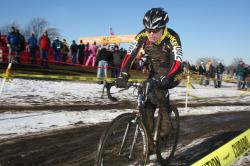 KC: I’ll do a handful of world cups this season. I’ll fly out for the first one and then come back to the U.S. for the USGP races in Louisville. I plan to spend November in Europe so I can get a couple more in. I’m not sure about what I’ll do after nationals this year. It depends on how I’m riding and the weather; I may stay here and train or head back to Europe to race and train.
KC: I’ll do a handful of world cups this season. I’ll fly out for the first one and then come back to the U.S. for the USGP races in Louisville. I plan to spend November in Europe so I can get a couple more in. I’m not sure about what I’ll do after nationals this year. It depends on how I’m riding and the weather; I may stay here and train or head back to Europe to race and train.
CXM: Favorite post-ride meal? Favorite post-ride meal if there were no consequences? What’s your vice?
KC: If I’m not racing the next day, New Belgium’s Triple and salt and vinegar potato chips. If I am racing the next day then I’ll have a recovery drink (Spike’s Surge Post Workout Drink) and eat something healthier. I love Baja Fresh after a race or any Mexican food or a good pizza. Pretty much anything that has fat and salt in it will do. I don’t really have a vice. I eat whatever I want when I want it; I just eat small quantities. I do love buffalo wings if they are cooked right and have the right tangy, hot sauce. There are a couple places near the University of Delaware that have amazing wings, so I only get them when I am at home. I used to eat wings and Old Bay fries quite frequently but I think that’s why I was such a big girl in college so I don’t do that anymore.
CXM: You’re a coach in your spare time, but do use a coach yourself? Do use a power meter? Hear rate monitor? Are they essential tools to remain competitive at the highest level?
KC: I do have a coach because it helps to have someone give you feedback about what you need to work on. I work with Craig Griffin at CTS. I’ve been working with him since I started racing on the Paralympic team and he knows my abilities well and how to train me around my leg issues. [Ed. note: Katie suffers from a still-undiagnosed leg-cramping problem that can last several weeks.] He’s the only coach who understands what works for me and listens to my needs really well. He also has tons of experience and knows how to develop a rider’s full potential.
I don’t use a power meter or an heart rate monitor. My heart rate monitor battery died when I was 15 or so and I never got it fixed, and I haven’t used one since. I use perceived exertion for training and that works the best for me. I don’t need a power meter to tell me I need to produce more watts when I’m getting dropped on the group ride or in a race. I listen to my body and back off when I’m tired and go harder when I feel good.
I think once you know your body and can gauge effort levels then using a power meter or heart rate monitor isn’t as necessary. Also, being a slave to the numbers can suck the life out of you; sometimes you just need to go out and ride your bike.
CXM: Obligatory doping question: You think ‘cross in North America has avoided the dopers?
KC: I do. ‘Cross environment doesn’t support dopers, and ‘cross riders are of a different breed here. Not sure about the doping in Europe, but I’m pretty sure it’s clean over here. I also think there is less doping in ‘cross because it’s a non-Olympic sport. There isn’t as much pressure to win medals since there is very little funding for it.
CXM: Your sponsor is an energy drink most have never heard of. How many do you drink a week? What makes them better than the others? Where can we get one?
KC: Spike Shooter is a new energy drink that is only available in Colorado and California right now. They want to be successful in those states before expanding to others. I probably drink 4/week or so. It kinda depends on how tired I am or if we’re driving very far. I also get used to the feeling so I don’t notice the effects as much if I drink them all the time. What makes them better is they actually taste good and the energy is real; it’s not just from sugar like most energy drinks. The energy comes from herbal supplements and caffeine. There are no calories and no sugar in the drink so you don’t get the energy crash an hour later. The energy lasts for about 4 hours and the drink also helps you focus too, so I like to drink one before racing on a technical course or for a little pick-me-up if I’m lacking a little motivation by the afternoon.
They come in two flavors now, the original fruit punch flavor that is made to go well with vodka and the new flavor, Quila Lime, which is my favorite and goes great with tequila.
They can be found in Colorado and California in some 7-Elevens, liquor stores, and Loaf and Jugs.
CXM: Who has the best burrito?
KC: Alfonso’s in Colorado Springs. My second choice is Baja Fresh.
CXM: How much wrenching do you do?
KC: None…Mark takes care of everything. I am quite capable of changing a flat and packing my bike for travel, but I don’t like it. Mark bitches about it but he still does it.
CXM: Single ring or double? What’s your gearing? Bike geeks wanna know.
KC: Double ring. I like having more gears to choose from and with two rings the potential to drop a chain or break a chain greatly decreases. I ride compact gearing but I can’t give away all my secrets.
CXM: Why the switch to Campy this year? No shop or sponsor would pick up that cost?
KC: I’ve never liked Shimano but rode the stuff since it was provided to me a couple seasons ago. I tried Sram this year and didn’t like it, so we went and bought Campy instead. I’ve always been a Campy snob (I can admit that) since it just works so much better and the quality is great. Mark can also re-build the shifters if needed, so that’s convenient.
CXM: Do you use/like in-line levers for ‘cross?
KC: I do. I like them for steeper descents and for training.
CXM: Favorite ‘cross tires?
KC: Dugast Rhino’s. They work great in pretty much every condition
CXM: Number of bikes you own? Separate race and training bikes? You ever ride a single speed or fixie not on the track?
KC: That’s a hard one to answer without having to get off the couch and look in the garage! Our garage is full of bikes and wheels and we can’t fit anything else in it, if that’s any indication of how many bikes we own. I think I have about 12 bikes in ridable condition. 5 of those are ‘cross bikes, a couple for training and a couple for racing. My favorite bike I just got is a custom-built Titanium 29er single speed mtb. It’s the most fun bike I’ve ever had. Joe at Primus Mootry built it for me at the end of this mountain bike season and that’s probably all I’ll ride next mountain bike season. I love it. I got hooked on single speeds when I got my first one in college and that’s all I rode for 2 years, so getting a new one is pretty fun. I now have two single speeds but I leave one bike at my parent’s house now so I don’t have to travel with a bike when I go back there. The trails in Delaware are also super fun and singlespeed-friendly so it’s a good home for that bike. I only ride a fixie on the track.
Mark and I are thinking about doing single speed worlds next year if it fits in our schedule. It just looks like too much fun.
CXM: Most common tire pressure for you in ‘cross?
KC: It depends on the course, but generally I ride 23-32 lbs. I think at worlds this year I rode 25 pounds in the front and 23 pounds in the rear for traction.
CXM: Maximum number of hours you’ve spent in a chamois?
KC: Had to be working a CTS camp in Buellton, CA; six hours max.
CXM: Was that with or without butter?
KC: Without. I’ve never used butter.
CXM: Any pre-race rituals?
KC: Not really. Get a good night’s sleep. Possibly ride the rollers in the morning for 20 to 30 minutes if my legs aren’t feeling great and the race is later in the day.
CXM: Most embarrassing or funny personal race story?
KC: I don’t really have anything good for this question, but I’ll tell a story from a race I did as a junior riding with the national team. It’s funny now but wasn’t so much when I was 16.
We did a three-day stage race in Colorado (I think it was in Fort Collins) and I’m a 16-year-old crit rider from Delaware who can’t climb very well. The first stage is a long day with 52 miles of false flat and a 9-mile climb at the end of the stage. I kept up till the real climb started and was dropped within the first mile.
Initially I thought, “I only have nine miles left, it won’t take that long,” but then I looked at my computer and realized how slow I was riding. “Three miles per hour! Shit, it’s going to take me three hours to get to the top!” I had a little breakdown at that point since I was already so tired, but there wasn’t any way to quit, so I had to keep going.
I toughed it out for another hour or so, but then the temperature dropped and it started raining/snowing on me. I still had so far to ride (and no rain cape since I had no experience riding in the mountains in the spring) and I could barely turn the pedals over, so I stopped and cried and felt sorry for myself. I was out in the middle of nowhere and there wasn’t any way to get out of my situation except for riding on. So I talked myself into getting back on my bike and sucking it up, and just when I thought I would never make it, one of the officials drove down on a motorcycle and pulled up next to me. I gave him a look and he immediately started pushing me up the hill. He pushed me all the way to the finish line. Apparently the race had been over for a couple hours and the officials were getting cold and wet and tired of waiting so he came down to help me finish.
That was a pretty demoralizing day for me and I remember it well. I haven’t sucked that badly since, but it’s a good reminder of how far I’ve come as a bike racer. I don’t know too many racers who’ve had to finish a race that way.
CXM: Your pet-peeve of other racers?
KC: Being cocky, that drives me nuts, and when guys jump in front of me before a technical descent because I’m a girl. I like to sit on their ass the whole way down till they make a mistake and then get by.
CXM: Race you’re most proud of?
KC: 2007 ‘Cross Worlds.
CXM: Music you’re currently listening to? Last movie you saw?
KC: A few alternative channels on XM satellite radio. Lily Allen is my favorite right now. Last movie was the Bourne Ultimatum; I have a thing for Matt Damon’s character in that series.
CXM: Goals for this year?
KC: Defend my national championship, do well at worlds and race as best I can.
CXM: How would you like to be described by your competitors?
KC: As a good person on and off the bike as well as a strong competitor.
CXM: How do you think they describe you? Are you friends with any of them?
KC: Hopefully they see me as I do and say good things! I can be shy sometimes and don’t always say much and that can be taken the wrong way I think. I am friendly with some of the girls I race with but it’s hard to be very close since we all live in different parts of the country. My girlfriends I ride with here are mainly mtb pros so we don’t really race each other for ‘cross. We’re very supportive of each other and push each other in training so that makes it fun. I also train with Mark every day and sometimes the Dunlaps will come out for a workout so that makes it hard too.
CXM: Advice to promoters/clubs on how to keep ‘cross growing? Advice to USA cycling?
KC: Make sure the courses are spectator friendly and in a place that’s convenient to get to for more than just the racers. Make the course challenging but fun too. Have a kid’s race or novice race early to include more people, and make sure there is good prize money for the Elites. Even if the fields are small for the women, give an 80% or 100% payout and give it to the top two or three so they can at least get their entry fee back. A well-run race with quick results and a quick podium is also important. A beer garden in a spectator friendly place will help too.
CXM: There aren’t many opportunities in a niche sport like ‘cross to give thanks to those who’ve helped you achieve what you have in the sport. Who would you like to thank?
KC: That’s a long list since cycling has been such a huge part of my life for so long. I think the most important people are my parents, especially my dad for introducing me to cycling and keeping me interested for so long, as well as coaching me on how to race and win. My parents supported me through all my racing and would still send me money for racing if I needed it. I’m very lucky to have them.
I’d like to thank Alaric Gayfer for coaching me on the track as a young junior and keeping it fun so I continued with racing. And Craig Griffin for getting me started with the Paralympic team where I learned how to race again, how to love riding and competing again, and for coaching us to gold medals in Athens teaching me how to suffer again and improving my strength and fitness.
And of course my fiancé, Mark Legg, for taking care of all my bike stuff and finding sponsors as well as keeping me sane and being my training partner, support staff and best friend.
And last but not least, Spike Shooter for fully supporting me so I can reach my goals as a racer, and Joe at Primus Mootry for building awesome bikes which allow me to ride fast too.






